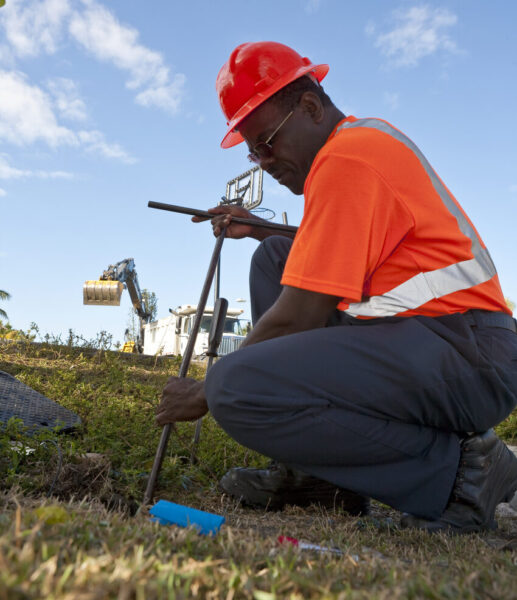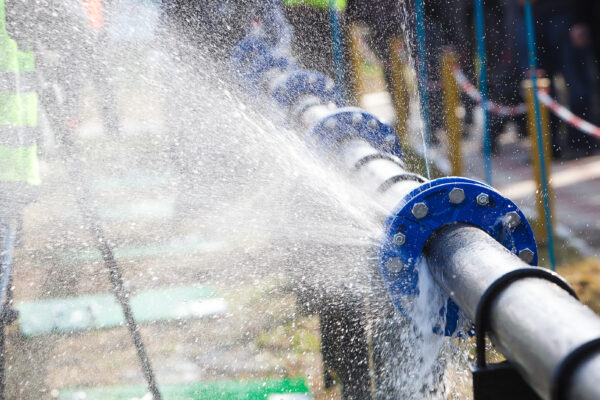Leak Surveying

Leak Surveys for Commercial Water Distribution Systems
Working in the municipal water industry, we understand the importance of system and network maintenance. One of the largest problems we face is “leakage” within the network, lost revenue, and decreased delivery. Water Services can provide comprehensive leak surveying for your water distribution system. Our skilled and certified team of industry professionals use advanced technology and non-invasive practices to accurately locate leaks and diagnose the cause of the problem.
Every drop of clean water is precious. Unfortunately, 30–50% of water is lost through aging infrastructure, and lost water equals lost revenue to the water service supplier. Water is lost through leaks and cracks in pipes and their fittings. Since most infrastructure is underground, it is virtually impossible to visually determine the location of these leaks unless the water has reached the surface (causing ponding and sink holes, structural damage, buckling pavement, etc.), and the exact location may be indeterminate. Leak surveying requires special technologies that allow inspectors to precisely determine the location and severity of pipeline leaks. This is a field that continues to grow and advance by utilizing both established technology and by adopting emerging methods. Water Services continues to stay in front of the latest technologies to insure that your municipality is safe and up to date.

Key advantages of Water Services leak surveying
- Reducing non-revenue water, such as raw water treatment costs and pumping rates
- We test on both side of the meter where applicable for a full review of delivery efficiencies
- It helps reduce liability of your municipality
- It reduces repair costs by addressing smaller leaks before they turn into larger emergent problems
- It will help avoid system contamination, thus reducing costly repair and avoiding segmented water delivery interruptions
- THE IMPORTANCE OF LEAK SURVEYING
Water lost through leaks, waste, or simple theft is referred to as non-revenue water, in that it fails to provide revenue to the water supplier because it never reaches its customers. These can be physical losses of water escaping the system, or unaccounted-for water that is not measured due to faulty meters and meters that have been tampered with, poor accounting and bookkeeping, or because of human error when reading and recording the water system flow meters. The accumulation of losses over long durations can result in significant losses even from insignificant leaks. If water can get out, impurities (soil, bacteria, organics, etc.) can get in and impair the quality of the water, even rendering it unfit to drink. These losses will continue over time until they are detected. - Non-revenue water losses are quantified the same way as water provided; volume (gallons or liters) per units of time (per minute for the actual leakage/flow rate or per year to measure accumulative losses). Water losses can also be measured in large water supply systems in terms of volume of water lost per the total length (miles or kilometers) of the pipelines that make up the water supply system. These values are then compared to the water supply flow rates to determine the percent of total water being lost or otherwise unaccounted for. As a general rule, water losses will vary proportionally with the age of the water supply system, or the ages of the various subsections of large metropolitan systems. Larger, older cities can have sections less than a decade old or older than a century.
- Since the city operating a water supply system can be its own customer, certain water flows are considered accounted for but non-revenue in the sense that the city does not charge itself for water usage. These applications include firefighting services, park sprinkler and irrigation systems, city-owned pools and recreational facilities, etc.
- Water Services can survey your municipality’s delivery system incrementally by mile or segmented areas completely as an ongoing or as desired proactive maintenance service.

Our trained and certified specialists will consult with the municipality team and review infrastructure maps or layouts if needed then will survey suspect areas incrementally per mile to identify potential leaks. Once identified, we will report findings and recommend a detailed action plan to address and fix the issues.
Please contact your WATER SERVICES representative to schedule your leak survey.